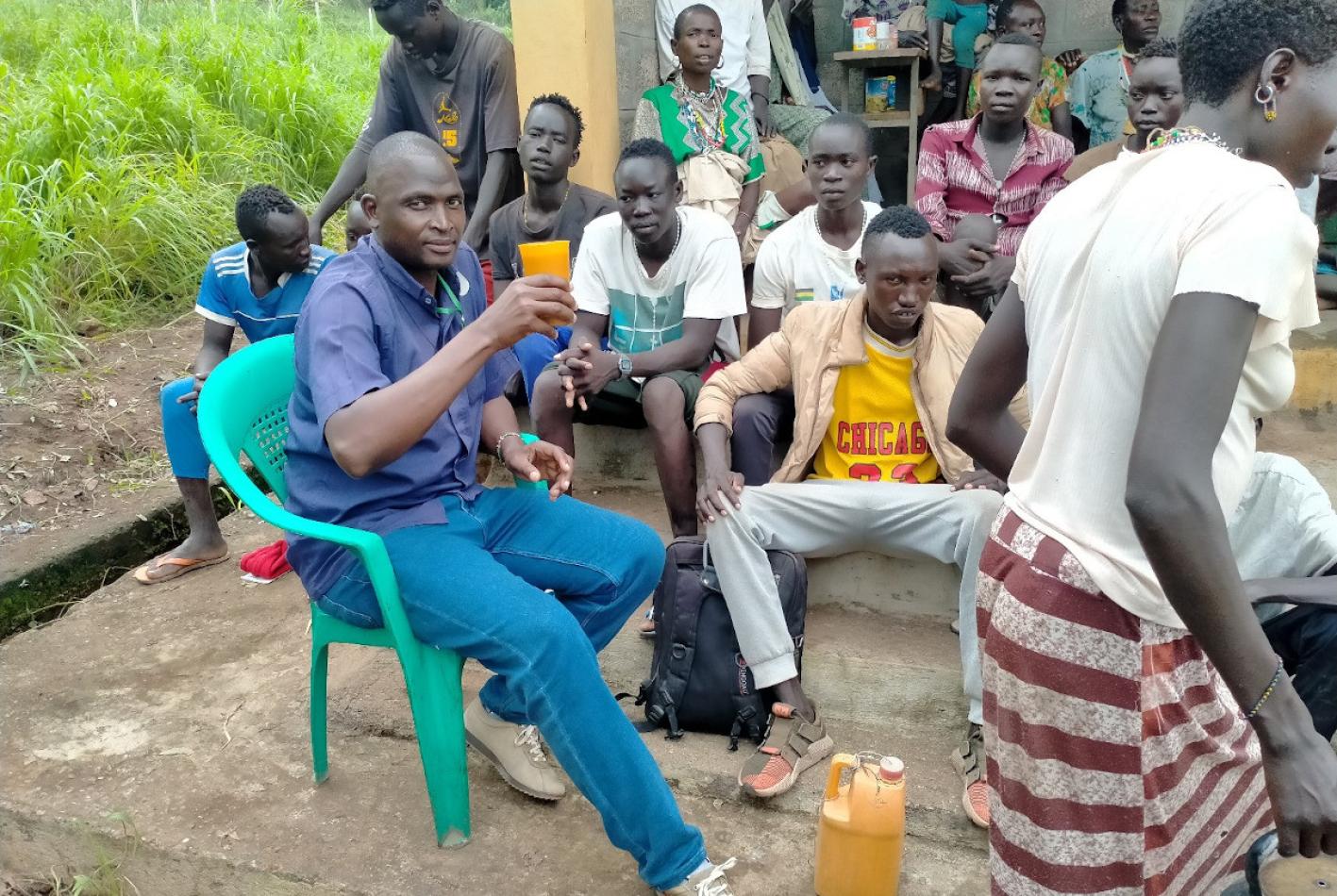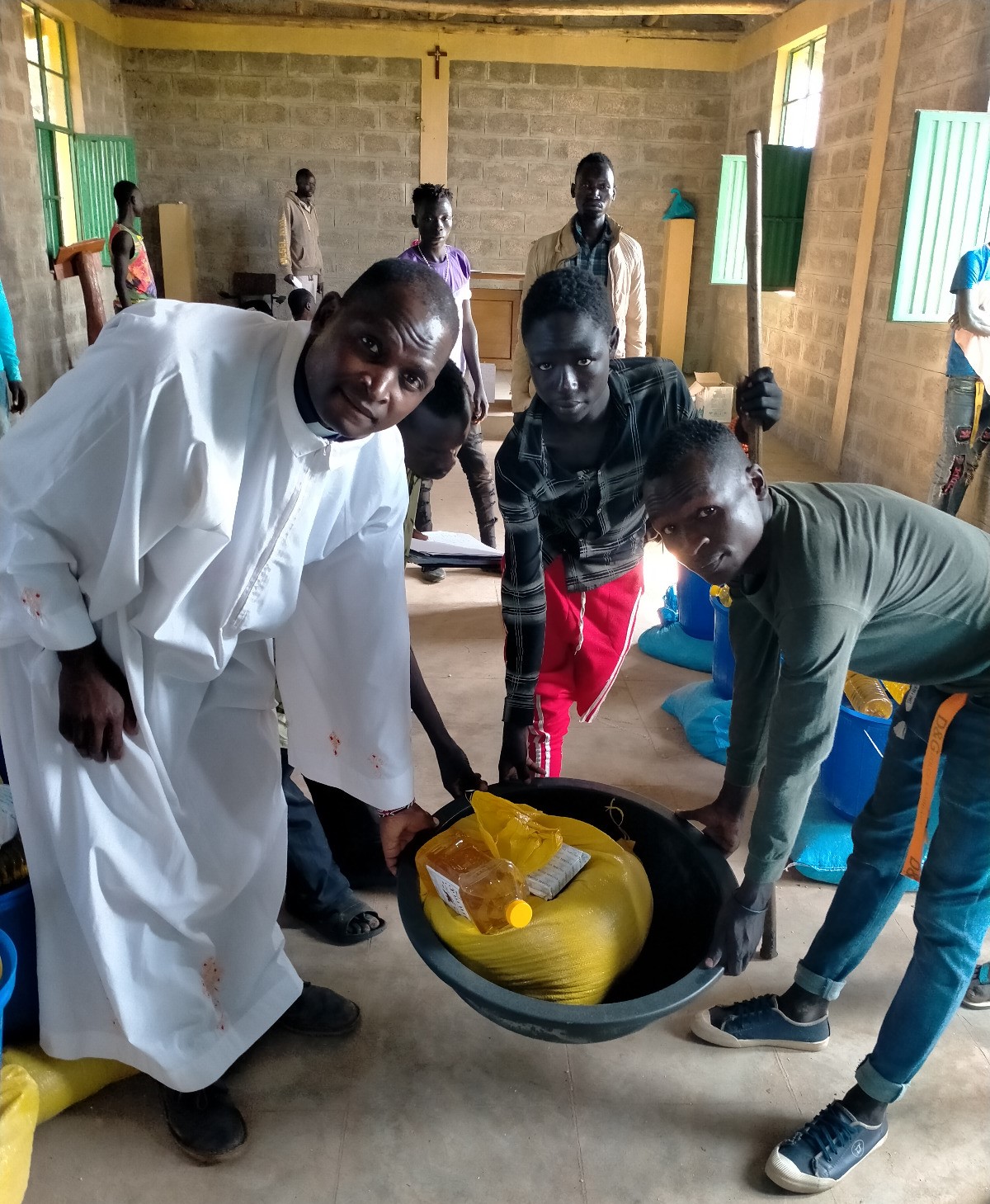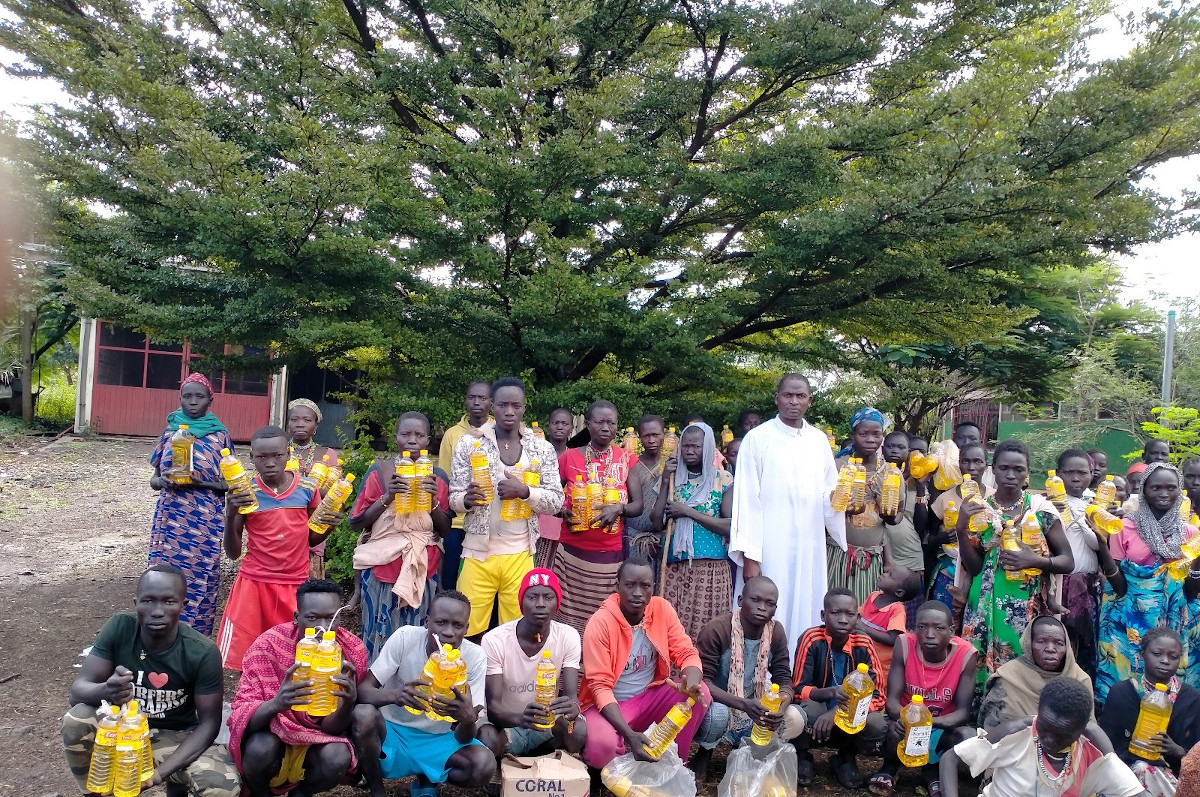Daniele Comboni
Missionari Comboniani
Area istituzionale
Altri link
Newsletter
Monday, June 24, 2024
For more than two years, conflict has been going on around the Catholic missions of Metekel Zone, in the Ethiopian region of Benishangul-Gumuz. Gublak Catholic Mission was the worst hit. Comboni Missionaries and Sisters of St. Joseph of the Apparition were forced to temporarily quit the mission in October 2020. They were left alone in the place after all the locals fled their homes. Through this article I would like to share some thoughts, hopes and sentiments from the eyes of a post-conflict pastoral minister. [Fr. Isaiah Sangwera, on the left in the photo]
The Comboni community of Gublak, after seriously evaluating the situation, decided to make a gradual return to the mission. This was done on a temporarily basis, pending the official permission from the Provincial Council. This move became a source of hope and encouragement to the people already and gradually coming back to their own homes. Once back in Gublak, the missionaries felt a great and warm welcome from their faithful who had been scattered for more than two years.
The community arrived in Gublak on September 26, 2022, the vigil of the Holy Cross feast, according to the Ethiopian calendar. The faithful, gathered for the vigil mass and damera – the liturgical bonfire – welcomed fathers Christ Roi Agbeko and Isaiah Nyakundi with songs of joy.
When we read from Jeremiah’s book, we become aware that, although the prophet’s lamentation was directed towards the wounds of God's people in Zion, Ethiopia in general and the Benishangul-Gumuz Region in particular also remain the site of struggle for political, socio-economic and religious freedoms. Is there no balm to heal the wounds of God's people?
Geographical facts
Benishangul-Gumuz Regional State is in the Western part of the country, bordering with Amhara region in the North and Northeast, Oromia and Gambella regions in the South and Southeast, and the Sudan in the West. The regional capital Assosa is about 679 kilometers West of Addis Ababa. Agro-climatically, most of the region lies between 580 and 2730 meters above sea level. The region is endowed with huge natural resources, including forest, agricultural land and water.
Gumuz people and the Comboni Missionary presence
The Gumuz are a people of Nilotic origin, few in number – about 200.000 – but covering a large territory. They were at the margins of Ethiopian society for many centuries. Now they have their rights and their own land’s control. They also have the right “to know that Christ has also died for them”.
Our mission in the Apostolic Vicariate of Hawassa has been – and still is – our main mission land in Ethiopia. Started in December 1964 with the arrival of the first two Comboni Missionaries, Fathers Bruno Lonfernini and Bruno Maccani, it was run by Comboni Bishops up to October 2017, when a Salesian of Don Bosco took the place of the late Msgr. Giovanni Migliorati, who had died of cancer in May 12, 2016.
The mission was a successful endeavor and finally the Comboni missionaries could move to other mission territories among “the poorest and most abandoned people” of North-Western Ethiopia. The first mission in this territory was started by the Comboni Missionaries Sisters in Mandura in 2000.The Comboni Missionaries followed them and opened the community of Gilgel Beles in 2003 and Gublak in 2011. It is really a territory of first evangelization and human promotion.
Our Project of Evangelization was spelled out in its main facet in various documents of our congregation and provincial gatherings in these recent years. “As Comboni Missionaries, we are convinced that our commitment to the poorest and most abandoned is the most important source of inspiration for efficacious MA…” – the Chapter Acts 2009 say in n. 182.
The MCCJ Ethiopian Provincial Directory n. 3.2 emphasizes our main reason of being missionaries as follows: “According to our tradition and being the Comboni Missionaries members of an Institute totally dedicated to missionary activity, first Evangelization in its various aspects is our main concern and an essential part of our identity”.
Comboni Missionary Commitment in Metekel Zone
Ethiopia is notably a multicultural, multiethnic and multi-religious country. An increasing feeling of ethnicity, favored also by the present political-administrative policy of the country, the Federation of States, has been spreading in the country. This calls the Church to foster those Gospel values that motivate communion and peaceful coexistence. It also calls on Christians to create unity, stressing the positive elements which are common to all groups and cultures.
In this complexity, the Church must play a role of promoting unity and understanding among the peoples, in order to be instrument of hope. In order to foster spiritual and human growth, stress must be given to initiatives of Christian-human formation at every level, helping the faithful to deepen their faith, their knowledge of God’s Word and of the teaching of the Catholic Church, its structure and tradition. Comboni Missionaries are committed to helping the local Church to become mature and self-reliant. In both missions among the Gumuz, we have laid a lot of emphasis and promoted the formation of lay leaders and catechists.
We are committed to contextualize the suggestions of the last General Chapters in our reality (Chapter Acts 2009, n. 59-66):
- To see with the eyes of the poor: We need to grow in adopting a more evangelical life style, in harmony with the reality of the local Church and the people we are ministering (Chapter Acts 1997, n. 20);
- To walk with the people: Making common cause with them, showing that we are with them and for them (Chapter Acts 2009, n. 58.3).
At social level
In the new socio-political context of Ethiopia, characterized by fragmentation and prone to ethnicity, our presence promotes understanding and reconciliation. “Our presence is meaningful when we are close to marginalized groups or in the frontiers situations” the Chapter Acts 2015 proclaim in n. 45.2. A presence always on the side of the less privileged. Even though working in Ethiopia, to be a prophet could be indeed challenging, we are called to a deeper commitment in the fields of justice, peace and of human rights promotion.
The Church’s long-standing commitment in the area of human integral development goes hand in hand with the catechetical training on the Social Doctrine of the Church to promote lay leaders able to contribute and to create a culture of life, peace, justice, sustainable development and respect of creation.
Missionaries were really tested
For the past three years, our missionary muscles and maturity were put to the test. Our missions went through insecurity, instability, looting, killings, with some Catholic faithful joining rebel groups. As missionaries, men and women, in this zone, we opted to remain with the people despite all dangers. We bore the consequences of our mission choices. In the recent intertribal attacks in and around Gilgel Beles and Gublak areas, we have been a great source of encouragement and refuge for our people.
Missionaries also became suspects, at times summoned by security intelligence organs. Comboni Missionaries working in Gublak were arrested in some occasions and even had their mission vehicle confiscated for a while. They were suspected of transporting stolen goods or, worse, having secret communications with rebel fighters.
Challenges and opportunities in this post-conflict mission
Inculturation: Inculturation of the Gospel is felt as an urgent requirement. However, this Gospel is yet to positively influence the lives of the people. We are lacking sufficient materials and resourceful personnel to organise regular courses that will be meant to initiate dialogue between some negative Gumuz cultural practices and propose Gospel values.
We are grateful the first missionaries who have taken some steps along this line. We will continue to cooperate with the local Church in the production of liturgical and catechetical materials, adopting the official government proposed grammar and spelling for the Gumuz language, in order to deepen the encounter of the Gospel with the local culture (Chapter Acts 2009, n. 57.3).
We have indeed made a firsthand experience on how far we are from touching the Gumuz culture of revenge and respect to human life. A close sharing with some Catholic returnees from the rebel groups reveal a lot. Humanly speaking they are very heart-breaking stories:
- In this post conflict era, as missionaries, how do we reconcile a catechist whose mother was dragged to a rebels’ court, quickly sentenced to death, because she was suspected to be a ‘budda’ (bad-eyed or witch)? According to the catechist, the ‘judges’ were made of some catechists. She was made to drink poison.
- Five non-Gumuz nurses were kidnapped and killed in cold blood simply because they were non-Gumuz. Some of our boys confessed they were part of the executing team.
- Some of our faithful were killed in cold blood and now the names of the killers are getting known. They are non-Gumuz residents living in Gublak town. Now that there is normalcy, as missionaries, how are we supposed to relate with them?
- Our house was looted of many of our properties. One day while taking a walk in Gublak’s local market, we noticed a Gumuz man wearing an alb belonging to one of us. We were in dilemma to take it from him or just to ignore him! He chose to leave him alone.
Dialogue: Dialogue is the basic attitude to be kept within and outside the Christian community. We are challenged to practice it within the Church-Family of God as well as towards other religious beliefs. It must take place at three main levels:
-
- Between Bishop, priests, religious, pastoral agents and the lay faithful of the local Church (Chapter Acts 2015, n. 44.14). This will transform us, Comboni family, into relevant and meaningful agents of evangelization.
- Between our local Churches and other Christian denominations or religions (Chapter Acts 2009, n. 58.8; Chapter Acts 2015, n. 45.3). We have noticed a new phenomenon of new mosques being built in many villages. These Muslims seem to be looking aggressively for followers. They are using different types of aid to lure people to join them unlike Catholic missionaries who provided relief aid to every one unconditionally and regardless of their religious inclination.
Conclusion
Evangelization is a complex and dynamic reality. I have underlined a few elements which may not give a full account of the mystery of evangelization by the Comboni Family in Ethiopia and among the Gumuz, in particular, in this post-conflict period. We may run the risk of impoverishing the concept of evangelization if we do not contemplate the work of the Spirit, protagonist of evangelization, who blows and acts in different realities and always in new ways.
Therefore, the main activity of the evangelizer remains prayer in contemplation of God’s work. This will help to discern how the Lord wants him to be a missionary, what range of actions and to whom He sent him to be His witness by announcing the Gospel with all his strength and love. It is the Spirit that places in our heart the same feelings of St. Paul: “Preaching the Gospel gives me nothing to boast of, for I am under compulsion, and I should be in trouble if I failed to do it” (1Corinthians 9:16).
It is the strength of the Spirit that guided Daniel Comboni to say: “Indeed, it would be easy and sweet to sacrifice my blood and my life to co-operate in the accomplishment of this holy work ” (Comboni to Mazza 23-01-1861).
“Put out into the deep – as Peter and his first companions trusted God’s work – and cast the nets” (Luke 5:4-6). These words ring out for us today, and invite us to remember the past with gratitude, to live the present with enthusiasm and to look forward to the future with confidence. “Jesus Christ is the same today as he was yesterday and as he will for ever” (Hebrews 13: 8).
Our work, our commitment, our journey and research of new ways of evangelization continue. May God guide us and bless us!
Fr. Isaiah Sangwera Nyakundi, MCCJ
Gublak Parish Priest






